Better Humans Make Better Leaders: Reuniting The Divided World With Jerry Colonna
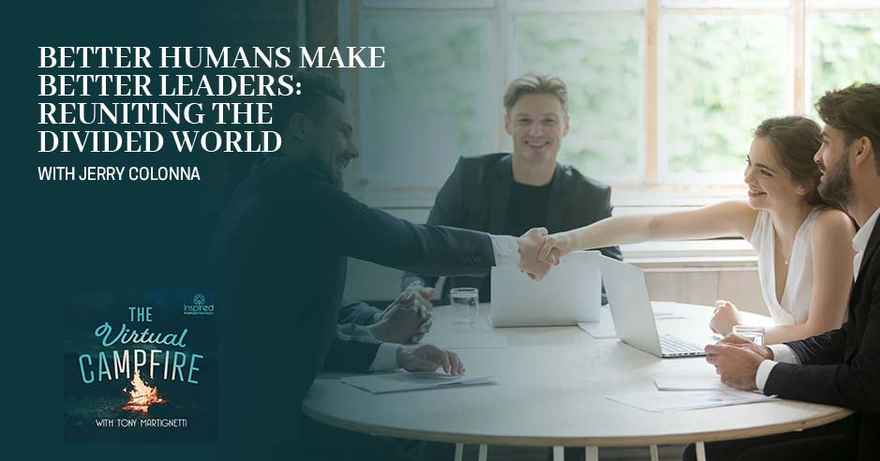
Humans are greatly divided because of our differences. We got to step back a moment and start the journey of reunification to build the systems of belonging. Joining Tony today is Jerry Colonna, the author of Reboot: Leadership and the Art of Growing Up and the CEO and co-founder of the Executive coaching firm Reboot.io. In this episode, Jerry talks about his latest book, Reunion: Leadership and the Longing to Belong, to explain how better humans make better leaders. He also touches on the importance of kindness, using the Radical of Self Inquiry, and knowing the truth of your ancestors. Let’s reignite the flames and gather around to reunite ourselves from being divided. Join Jerry Colonna and Tony Martignetti in this grand reunion to become better humans.
---
Listen to the podcast here
Better Humans Make Better Leaders: Reuniting The Divided World With Jerry Colonna
It is my honor to introduce you to my guest for this episode, Jerry Colonna. Jerry is the author of Reunion: Leadership and the Longing to Belong. He's the CEO and Cofounder of the executive coaching firm Reboot.io or Reboot as we would say. A highly sought-after coach and speaker, he is also the author of Reboot: Leadership and the Art of Growing Up. For many years, he has used his experience as a CEO, investor, journalist, college professor, and lastly, coach to help people lead with humanity, resilience, and equanimity.
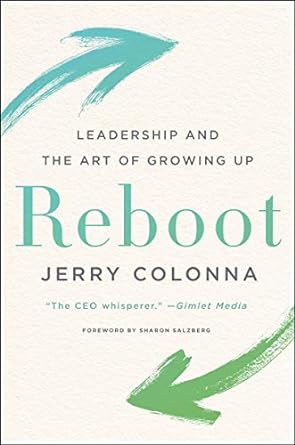 He is astounded by the fact that he lives on a farm outside of Boulder, near the foothills of the Rockies and far from the streets of Brooklyn, where he was born and raised. He's the father of three amazing humans, each of whom cares deeply about the love, safety, and belonging of others. I'm so honored to welcome you and bring you into the space of the show.
He is astounded by the fact that he lives on a farm outside of Boulder, near the foothills of the Rockies and far from the streets of Brooklyn, where he was born and raised. He's the father of three amazing humans, each of whom cares deeply about the love, safety, and belonging of others. I'm so honored to welcome you and bring you into the space of the show.
Tony, I can't tell you how delighted I am to be here with you. There are times when you pop into an interview and have a conversation. You immediately see a kindred soul. I feel that kinship immediately.
That means the world to me, Jerry. I can't wait to continue this warm connection because I know that what you're going to share here is going to be something that the readers are going to enjoy and find a connection with you. I'm so excited. This has been a long time of making for me because I've followed your journey since I read your first book, which is not your full journey but has gotten me intrigued by who you are. I'm so thrilled to have you here. Let me start by saying what we do here is share people's stories through what's called flashpoints. Flashpoints are the points in your journey that have ignited your gifts into the world. Looking at your bio, you've done a lot.
I can't hold a job.
That's what it is but sometimes that's the best thing about life. When you can't hold a job, you end up having lots of interesting pivots. I want to give you the space to share. What were those real moments that have defined who you are and made you into who you are? You can start wherever you like. We'll pause along the way and see what themes are showing up. It seems amorphous but I do that intentionally because I want it to be something that allows you to be free to explore.
I appreciate that. What comes to mind is this notion of creating a little bit of a leadership journey like, how did you become who you are? I relate to that. There are many moments. If you recall in Reboot, my first book, I talk about the misconception that we have that life moves up and to the right in a straight line. When in fact, we tack across the surface of the lake. We sail into the wind and when the wind shifts, we shift. That way, we make our way across.
Seeing my life through that metaphor, there are a number of different switches of the sail shifting into the wind. I'll go back as far as the decision to go to college. When I was a teenager in high school, I didn't understand it at the time but I was entering a period of profound depression around my junior year in high school. It started manifesting in my senior year in high school when this very good boy started cutting class and spending a lot of time at Coney Island instead of going to class.
There was an intervention on the part of some of the guidance counselors and I began seeing the first counselor I ever saw. He patched me up and sent me on my way. The summer after my senior year in high school, I had made no real plans to go to college. Before the deadline for registering for classes, I biked over to Queens College, City University of New York from my home and then to Ozone Park, Queens. I went from Ozone Park to Flushing and signed up for classes.
I didn't know how I was going to pay for school. I just signed up for classes and ignored the bills when they came in, which is not a good strategy. By the end of that first semester, I was so depressed that I tried to kill myself. What followed that was three months of in-patient care at a hospital. I then was patched up and sent back out into the world. I missed the next semester but picked up the following semester and kept going.
I say that because it's not one of those pivot points that I often talk deeply about. I mention that but usually in the context of the depression but given the sweetness of your question and the depth of it, there are a number of those moments. I won't go through all of them but it was probably a seminal moment because what I was headed for was not the life I ended up having. What followed after that was a series of interventions usually from extraordinarily caring and gifted adults who had the capacity to see the broken heart of a young boy from Brooklyn.
I think back to my high school guidance counselor or college advisor, Dr. Robert Greenberg, who ended up getting me a scholarship that paid for that tuition. Also, the people that I first gave me a job at CMP Media, which no longer exists but was subsequently acquired several times. They gave me a job and career. They gave me a sense of my worth. All along the way throughout my life, there were these incredible human beings who gave a thing. I'll close by saying that if there's anything that shapes me into who I am, it's my wish to pay back all of those people who made a difference in my life.
Hearing you share this, it's like your life has been a testament to that. You and I are not even touching the surface of all the things that you've done but what I hear from you is this person who feels deeply. You feel deeply so you experience life on a very deep level. Therefore, along with that, there comes some suffering that we sometimes experience when we have a sense of deep empathy for others and the world around us. That makes us sometimes a good listener and connectors of other people. That's the downside of it. You can feel so deeply that it’s sometimes detrimental to how you experience the world.
My wife Ali likes to point out that I'm not a muggle. I'm a wizard. God bless her. Part of my original experience as a child, you nailed. Probably because you recognize it in me what you know is in you. The readers can't see that he's about to cry as I point this out. I got you. I did not know what to do with that extrasensory perception as a child, where I felt everything, so it became an inward suffering.
In Reboot, I call these moments in our lives asteroid strikes, where an asteroid hits you and sends you in a different direction. When I think about all the different asteroid strikes that have hit me, the one I shared with, the common traits of those strikes are people seeing me for who I am. It’s people almost acting as mentors and being able to say, "It's okay. Here's how you can be in responding to the world.”
I think of my Buddhist teachers, Sharon Salzberg and Pema Chödrön, each of whom I have a deep and powerful personal relationship with. How lucky am I? What I see in them are models to how to be with, in Buddhism, we'd say bodhicitta, which is an open heart. The thing about having an open heart, and you know this well, is it hurts. We live in a world where we are at each other's throats. We are so divided. This is beyond cancel culture or arguments about wokeness. We are at a point where babies are being killed. How low can we go? When you are all sensing and feeling wizard, you feel it all.
You can't just turn your head and say, “It's not happening. It's a reality.” I'll take quite a little detour. I had a coaching session with one of my clients who's in the Ukraine. We haven't spent a lot of time talking about Ukraine because our tensions are elsewhere. It still happens. He’s in an MBA program but the reality is because he's in school, he's exempt from military service but that ends soon. He's a new father and he potentially will be back on the list for serving.
He doesn't even have to serve to feel the pain and suffering. Hundreds of children were taken and thousands of lives were destroyed. We are at each other's throats. It is the wars of petty minds seeking power and using our suffering and weaponizing it to turn human beings into weapons of war. As you all know from the new book I wrote, Reunion, it's incumbent upon us when confronting this suffering to ask a very difficult question, which is, “Who's benefiting from a land war in Europe?” We know who's paying the cost. We can see that if we dare to look but who's benefiting? Someone is always benefiting from suffering.
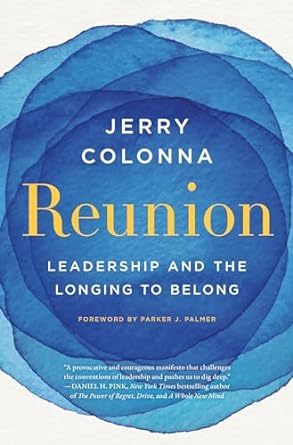 You bring up such a great point. First of all, at a very high level, I can see this as if you follow the money and look at the force, people always think, “You see people on the land fighting the war but they're only being programmed to think this is what is in benefit of me.” The reality is behind them and that person. There's usually one person or a small group of people who are orchestrating it because it's their benefit.
You bring up such a great point. First of all, at a very high level, I can see this as if you follow the money and look at the force, people always think, “You see people on the land fighting the war but they're only being programmed to think this is what is in benefit of me.” The reality is behind them and that person. There's usually one person or a small group of people who are orchestrating it because it's their benefit.
Part of what fuels in Reunion, and I used the term that I learned from John Powell, is the notion of systemic othering. Part of what's happening is the tendency of human beings to fear the other person, however they are different. That tendency is continuously weaponized so that human beings can commit atrocities. I reference my Buddhist teachers. In Buddhism, one of the most important core beliefs is we all have what's known as Buddha nature, this extraordinary capacity to love and be compassionate.
That Buddha nature can be painful. As we noted before, it leads to this opening and unguardedness, which can hurt. What I find fascinating is the tendency to weaponize people so that they overcome their natural empathy and use fear, intergenerational suffering, and war as a means to get people to dehumanize the person across from them. I firmly believe that human beings cannot commit atrocities as long as they understand the humanity of the person in front of them and more poetically, their story of belonging.
We all have what's known as Buddha Nature and this extraordinary capacity to love and be compassionate. That Buddha Nature can be painful.
I love that you brought it there because there's a sense that we need to know what is it that is our story of belonging that connects us to a certain tribe or place. That's important. Somehow, we start to lose sight of all that when we get clouded by ideologies and things that come along. I love that you talked about this idea that in our nature, we're not wired to be malicious necessarily but it gets clouded by maybe aligning ourselves with an ideology that is not necessarily right or wrong, right in terms of how we're meant to think.
There are wiser people than me who could speak to evolutionary psychology and biology. There probably is an evolutionary psychological need for what one might say is tribalism, my people. I could see going back to Neanderthal times trying to understand who my people are but we are not Neanderthals. Can we extend that notion of tribe in such a way that we can accept the profound differences? I joked with you about your baseball team. I won't name them because I'm a Yankee fan and Tony lives in Boston but there's a tribalism that goes along with that.
We can both laugh and enjoy it. We can be empathetic and say, “We can both hate the devil race and laugh.” What happens is that human nature tries to find the like and the group to whom we belong and root ourselves in that. Instead of being a source of empathy, it becomes a source of division, especially when it's manipulated by the mendacious, malicious forces of evil who say, "Tony is afraid of Jerry so let's turn Tony and Jerry against each other."
It’s as a weapon against each other.
Also, as a maintenance of some structure that protects the powers that be. I identify as a White male cisgender and straight. There is this belief system that's sweeping a country that people who look like me are at risk. Let's be clear. Everyone is at risk from climate change and war but a mother from Venezuela trying to make her way on the Southern border of the United States is not a risk to me. Our border policy sucks but I can't remember when it ever was a good policy. This is beyond politics.
What's missing is empathy. What is at the root of that poem about the Statue of Liberty, “Give me your tired and poor,” is empathy. I use this phrase throughout Reunion, "Your story is my story." If I can see that you and I have not so much in common that our differences are erased but so much in common that we can feel each other's stories, despite who you like for baseball, I can still love you.
The word that comes to mind for me is expanding the circle. We can honor the differences and expand the circle such that it's inclusive enough that allow all of us to feel like we belong in the same place, even with differences. That is powerful. In my book, I talked about the concept of bringing together a group of people who have divergent minds but convergent hearts. It’s in the sense that we want different thinkers and different people who think differently. That doesn't mean that we're all going to come together and think the same but we are convergent in the sense that we connect and say, "I honor you and who you are.”

I love your use of those two words and the pull between them, divergent and convergent. That's brilliant.
Thank you. I appreciate it. Since we got into this Reunion very quickly, I'm looking forward to sharing more about the book. I want to get back into your story for a moment and hear more about what brought you from doing the work you were doing. As a young adult, how did you get into the journey of starting Reboot? Tell me more about the moments that led up to it.
If you will, the curriculum vitae includes things like I was a journalist in my twenties and then became an internet investor in my late 20s or early 30s. I rode the first wave of internet investing until my late 30s when that lifelong relationship with depression caught up to me. I had to walk away from what was a very successful career as an investor to come to figure it all out. I did that starting around 38 or 39. The suicidal feelings had come back and I was struggling.
That was the time when I began studying Buddhism. Many Americans come to Buddhism by way of suffering. It tends to be our doorway to the Dharma. After a few years of wandering in that desert, I found my way to training to be a coach. In a sense, before Reboot, I was a coach for over a decade. As a consequence, we found a Reboot as a mechanism for broadening our capacity to serve more people and collaborate in different ways.
If you want, you can draw a through line through everything or several through lines. Curiosity, empathy, and the ability to sit still and listen. Another one is simply a fascination with the human heart, which is an extraordinary organ. I'm not referring to the biology. All of that led to writing my first book, Reboot, and my second book, Reunion. At the core of everything that I do as a coach is a simplistic belief that better humans make better leaders. I say it's simplistic because except that we have terrible leadership, which means this process of being a better human, is hard.
Better humans make better leaders.
Just because it's simple doesn't make it easy. That's the thing. We have to start from that top and repeat that like a mantra. How do we continue to think about how are we going to be a better human so we can be better leaders? That is a starting point. If everything was running smoothly, then we wouldn't need coaches and people who can.
We'll work ourselves out of jobs. We've got to be careful.
I know but the reality is that's not where we are. We still have so far to go and we have so much to learn as a society and race.
Also, as a species.
In some ways, that's a good thing because learning is part of the process of becoming our best selves.
Many years ago, I had a profoundly moving conversation with one of my mentors, Parker Palmer. We were like two old men sitting on a park bench. We were joking about the fact that so many people come to us and say, "What is the meaning of life?" We used to laugh and say, "The answer is a question and it's, ‘Have I been kind?’” There's a profound lack of kindness in the world, isn't there?
The whole conversation we've had so far has spoken to the fact that we need more of that kindness in the world. That is a great point for us to come back into Reunion and talk about this beautiful book that you've written and some of the concepts, which people need to hear for those who have not read the book already. I'd love to have you share some of the key ideas that you haven't already shared about the book.
As I noted, there's a fundamental belief I have around this notion of better humans making better leaders and it's a playful way to construct it. That was at the core of my first book. At the core of that book is this notion of using what I've referred to as radical self-inquiry to inquire within and understand the ways we contribute in our complicit in creating the conditions we say we don't want. Probably my most famous question out there in the ether is how have I been complicit in creating the conditions I say I don't want?
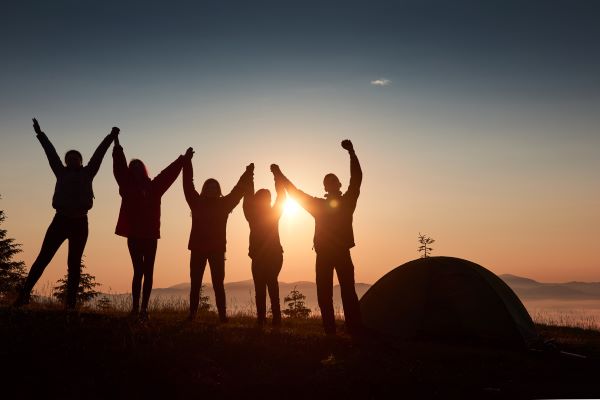
That thesis remains solid and true but it's also insufficient. What helped me understand that were the protests following the murder of George Floyd in the summer of 2020. My main teacher on that was my daughter, Emma. Emma, like so many millions of other people, took to the streets to protest despite COVID and the risks. I had to ask myself a very hard question, “Mr. Better Human Makes Better Leaders, what are you doing about this?” That's the way my daughter, who is always on to her father and his shenanigans, would put it to me.
Reunion is the result of that. I sought to try to understand what are the moral and ethical responsibilities of those who hold power to lean into the very difficult questions that divide us so that we can come back to a very hopeful stance implicit in that word, reunion. There's a brilliant poem by the late Bell Hooks called When Angels Speak of Love. She says, "When angels speak of love, they tell us all things are union and reunion. There is no separation. There is no end to paradise.” There's an instruction implicit in that poem. It's a coded message from one of our most important elders. What she's saying is, "Listen for the angels speaking of love."
Listen for the angels speaking of love.
That comes from our hearts, not from our minds. That's one of the things that is a through line as well, which is to say you've focused on the heart, not just the intelligence of the heart that is coming from the voice of what's most important that we need to care for each other.
I'll bring you back to one of the first observations that you were making, where we batted it back and forth about this notion of Bodhicitta. Bodhicitta translates to awakened heart or can otherwise be seen as an open heart. If you put those notions together, we have an elder who has become an angel herself in Bell Hooks and she says, "When angels speak of love.” To hear angels speaking of love, one has to open one's heart. The problem with opening one's heart is that it hurts. We'd rather not, thank you very much. We'd rather look away and bury our head in the business and say, "It's just business," but when we have the bravery that our elder angels speak of, we have the capacity to end separation. What a beautiful image.
Hearing you say this has me thinking about that's where the secret lies. The secret to life has been a question but the secret to life is about the heart and listening to our heart.
Have you been kind?
That's not about here. It's about pointing to my heart.
Have you been kind to yourself? Have you been kind to the people that you work with? Have you been kind to the world at large? Have you been kind and created the conditions of kindness so that a mother migrating from Venezuela through horrific conditions can be met at the border of the United States on these teeming shores with kindness? It doesn't mean you're allowed to do whatever you want. It just means kindness.
Decency is what we're looking for here.
That's a great word, decency. That's right.
Jerry, I don't even know where to begin here. This has been such an amazing conversation. I want to ask a question about your learnings about yourself on this journey that you've been on. What is one lesson that you've learned about yourself that you want to share or you haven't shared yet? Maybe it’s something profound that you feel others can bet value from.
Part of the thesis of Reunion is that we need to know our ancestors and the truth of our ancestors. Not the myths that we've grown all sat around the dinner table on Sunday afternoons talking about how grandpa did this and how great grandma did that but what was their real story. One of the things I had to learn about myself and experience was that in endeavoring to understand the truth of my ancestors, I had to look in the places that my family had taught me not to look in. The truth is there are oftentimes these negative spaces that are created by secrets.
We need to know the truth of our ancestors, not the myths we've grown.
In my case, there was a well-known secret. It was a secret and it was not discussed, which was the truth of my father's birth. I rather not go there, thank you very much. What I came to understand is that in the negative space left by the things not spoken about, forces that tear us apart one from the other grow. I'm not just speaking like the sage on the stage saying, “I know this to be true.” I know this to be true because I know it about myself. If there's a succinct way of saying it is, to endeavor to do the work of lasting reunion, one must be willing to look into those places that we'd rather not. Thank you very much.
Darkness holds so much. Sometimes we have to face that. This has been the premise. Everything I do on this show is looking back on our past and understanding it better allows us to move forward a little more powerfully than we had in the past. It's about, and we’ll use another RE word, reconciling with who we are. I appreciate you sharing that. We have one last question and this is a very lighthearted question but I need to know. What are 1 or 2 books that have had an impact on you and why? I can't wait to hear it.
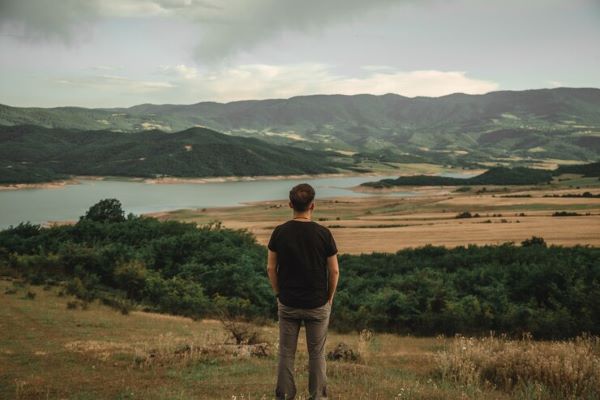
I'll share two books and also, if you don't mind, I would like to share a poem as well. The two books would have to be Faith by Sharon Salzberg, which as she will describe was the most difficult book she's ever written because it forced her to look at the reality of her childhood, and then Let Your Life Speak by Parker Palmer.
Part of why Let Your Life Speak was so impactful for me was that it was the first time I read someone speaking of their struggles with depression in a way that I could model myself in confronting my experience. One of the things that we suffer from is the stigmatism associated with struggle. Those two books, I'm a prolific and voracious reader. There are thousands of books but those two books always stand out. If I may, I'd like to perhaps close, and if you don't mind, can I read this poem for you?
Please.
I should explain. This is a poem by Joy Harjo. Harjo is an Indigenous woman. She was a poet laureate for the United States. I discovered this poem when I was in the middle of writing Reunion. Before I read it, think of it as a prescription. The poem is called Remember. “Remember the sky that you were born under, know each of the star’s stories. Remember the moon, know who she is. Remember the sun’s birth at dawn, that is the strongest point of time. Remember sundown and the giving away to night. Remember your birth, how your mother struggled to give you form and breath. You are evidence of her life, and her mother’s, and hers. Remember your father. He is your life, also.”
“Remember the earth whose skin you are: red earth, black earth, yellow earth, white earth, brown earth, we are earth. Remember the plants, trees, and animal life who all have their tribes, their families, their histories, too. Talk to them, listen to them. They are alive poems. Remember the wind. Remember her voice. She knows the origin of this universe. Remember, you are all people and all people are you. Remember you are this universe and this universe is you. Remember all is in motion, is growing, is you. Remember language comes from this. Remember the dance language is, that life is. Remember.” What ails us in addition to the lack of empathy is our inability to remember we are all earth.
I'm speechless, honestly. That is a beautiful piece. It has me thinking so much about my family and all of the things that have come before me. Also, everything that's ahead of me. I have a complete reframe at this moment.
Take a breath and remember your ancestors, their journeys, and what they have gone through. Honor them. Be the descendant they deserve. Be the ancestor that your descendants deserve.
Remember your ancestors and their journeys. Remember what they have gone through and honor them. Be the descendants they deserve. Be the ancestor that your descendants deserve.
Jerry, you're leaving this audience with some profound reflection. This is just the taste of how you show up in the world. I'm so unbelievably grateful and honored that you chose to be in this space with me. I want to thank you. That's not even enough. Thank you so much for being here.
Thank you, Tony. Thank you for the work that you do, for creating spaces like this, and for welcoming me.
Before I let you go, one last thing I'll have to ask of you is what's the best place for people to find you if they want to learn more?
Reboot.io is the company website. Reunion.Reboot.io is a website for the book. On that, you'll find videos, essays, and people sharing their stories of belonging. We invite you to do the same as well.
I honor your time. Thank you, again. Thanks to readers for coming on this journey. It’s truly remarkable. Go grab Jerry's books and check out his website. There are so many great things to check out. That's a wrap.
Important Links
- Reboot.io
- Reunion: Leadership and the Longing to Belong
- Reboot: Leadership and the Art of Growing Up
- Faith
- Let Your Life Speak
Love the show? Subscribe, rate, review, and share! https://www.inspiredpurposecoach.com/virtualcampfire


0 comments
Leave a comment
Please log in or register to post a comment